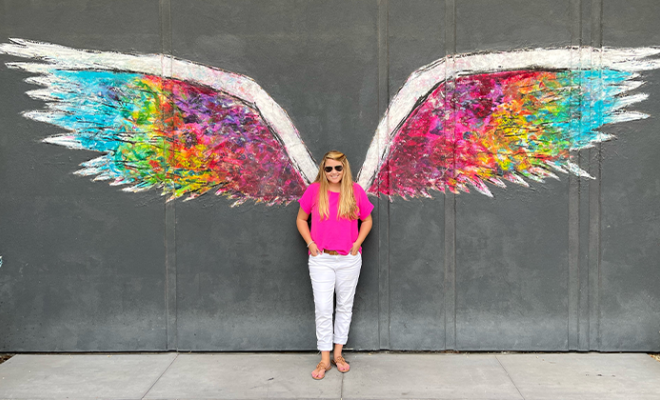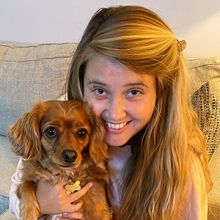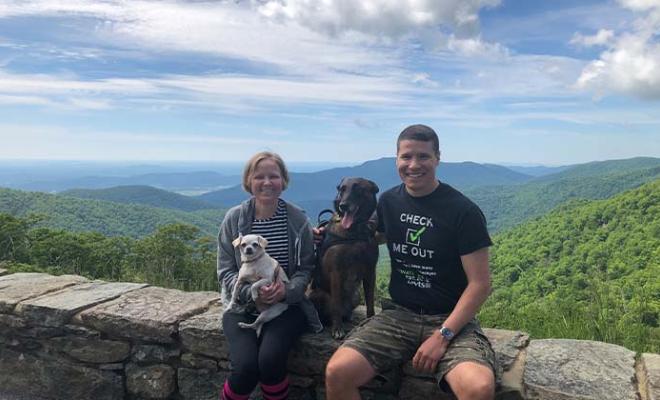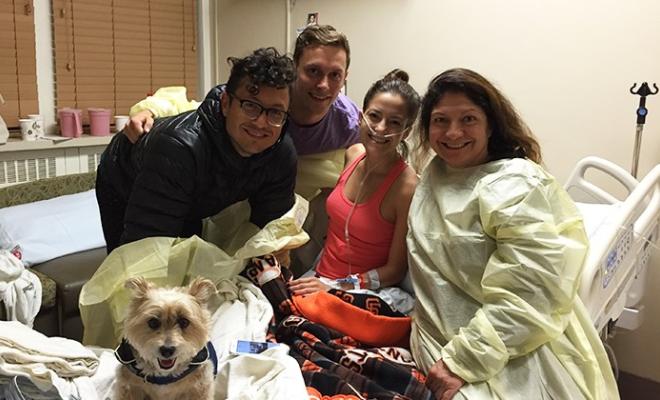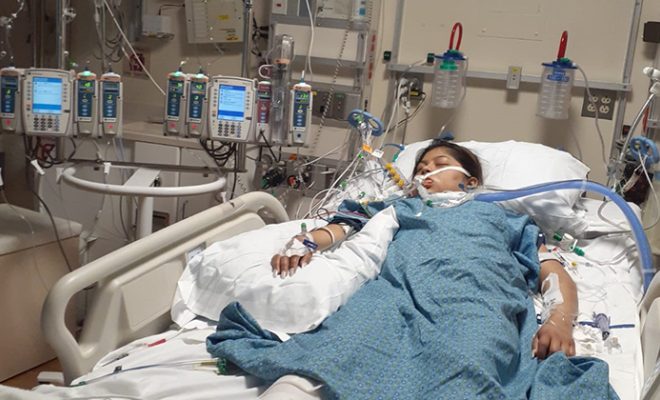“Whatever you do, make sure she keeps her lungs as long as possible. Transplant is a death sentence.” Twenty-five years later, the words my doctor said to my parents when I was diagnosed with cystic fibrosis ran through my head every time my lung function fell or I was hospitalized.
My lung function was always an issue. No matter what I did, how many IVs and drugs I was on, it never went up or remained stable for long. During high school and college, my FEV1 fell from 60% to 30% and it seemed like there was nothing I could do. But no matter how low my lung function was, I was determined to avoid a transplant.
I was convinced that my doctor’s advice from 25 years ago was still true, so I considered lung transplant a death sentence. I tried to convince everyone around me that I was fine, that I could hold on until the modulator that would help me was available. I tried to keep up with my friends, but by the time I got to college that became impossible. I was missing nights out with my friends. I was leaving for class an hour early to make sure I had time to walk across campus. I was pushing myself and burning the candle at both ends.
After graduation, I was offered my dream job, but my health gave those around me pause. My family was worried that working a full-time job with an FEV1 in the low 30s was not a viable option, but I needed to prove to them — and myself — that I was still okay. After only four months, my doctors told me that if I didn’t stop, I wouldn’t be alive in a year. It was time, they said. I needed to be referred for a transplant. To appease my family and my doctors, I agreed to start transplant evaluation.
Once I met with the transplant team, they thought it was important I start the evaluation process as soon as possible. Within a few weeks, they were able to schedule all the tests I needed. After 25 years of living with CF, I thought I had been through my fair share of tests, but the evaluation process put all that to shame. I was at the hospital every day for two weeks while they tested every possible part of my body and then some. It was the most mentally and physically exhausting process of my life. After the evaluation, I was even more sure that a transplant was not the answer for me.
After expressing my convictions to my CF and transplant teams, we came to an agreement: I would continue to keep up with the tests I needed to be listed so I could be listed as soon as possible when the time came, and they would let me put off the candidacy and listing itself until I was ready. For the next few months, I focused on my health and made sure that I was resting as much as possible.
But nothing seemed to stop the progression of my CF. It wasn’t until almost a year after my evaluation that I realized it was time. I was eating Christmas dinner — my favorite meal of the year — and I was sitting next to the open window at the table to get as much cold air as possible.
I couldn’t eat because pressure from my stomach on my lungs made it that much harder to breathe. It was then, staring at my plate, that I realized something had to change. I knew in that moment that by next Christmas, I either wouldn’t be there, or I would have new lungs.
At my doctor’s appointment two weeks later, I told my team that I was ready for the next step. I wanted the transplant committee to consider me for a candidacy.
The candidacy process for transplant isn’t all that different from applying to college. You are waiting for a team to decide your future — only transplant is a life-or-death situation. The committee that decides whether you are a good candidate is normally made up of your transplant team, the surgeon, a social worker, and a psychologist. They are looking to make sure that your body can withstand the surgery and you’ll be able to take care of yourself and your new lungs afterward.
I was pretty sure that I would be approved based on my test results from my evaluation, but that didn’t take away the stress of waiting for that phone call. I knew that this was my last chance; if I wasn’t approved, I didn’t have any other options. Thankfully, a week later, my transplant team told me that I had been approved and that I would be listed with a Lung Allocation Score (LAS) of 45.
A rush of emotions came over me. On the one hand, I was so grateful that I was approved. On the other, I realized that I just signed up for a lung transplant. While I knew a transplant was the only thing that was going to save me, I still was not emotionally or mentally ready to actually go through with getting one.
I was put on the waiting list for a transplant. The LAS score that I was given determined where I fell on the list. Because I had ignored all things transplant up until a few months before this, the list was a totally foreign concept to me. I learned the worse my heath got, the higher my priority on the transplant list. After I was listed, my health deteriorated. I was placed on oxygen around the clock and I needed a BiPAP, a device that helps with breathing, because my body was no longer able to expel the CO2 I was producing and it was poisoning me. I couldn’t eat. I was out of breath just sitting in bed.
I got my first call on April 1, 2016. Everyone thought it was an April Fool’s Day joke, so it took me a while to convince everyone to go to the hospital. When we finally did all get there, I was a mess. I was not ready for the surgery. I was crying and having anxiety attacks as the doctors prepared me for surgery. Before they wheeled me out of my room, the surgeon told me the donor lungs were no good. I had never been so relieved. A few weeks later I got a second call. Although I was much more relaxed and I understood the process the surgeon told me — again — that the lungs were no good. I went home again to wait.
My mindset changed over the next few weeks. I started hallucinating and I knew my body was breaking down. I made my peace with whatever was going to happen. I wasn’t really living in that state, and if transplant could offer me a chance to live again, I was ready. Finally on June 8, 2016, I got a third call …
That night I slept like a baby. I don’t remember much about the next day until they brought me down to pre-op. My family, my best friend, and my boyfriend — now my husband — came and said what we all hoped wouldn’t be the last goodbye. And then my dad, as he did for all the other surgeries before, went back with me into the OR.
I don’t remember going into the last room I had my lungs in, but my dad said once I saw all the machines and people waiting, I turned to him and said, “I’m good, I don’t think I need a transplant.” There were a few complications, so what is normally an eight-hour surgery turned into a 12-hour surgery. My lungs were in such bad shape they couldn’t hold up to the normal surgical process, so I had to be put on ECMO (extracorporeal membrane oxygenation) and had to have four blood transfusions.
The next thing I remember is waking up. As soon as I heard them say I had a transplant I was filled with anxiety. I tried to grab my chest, telling them to get the new lungs out because they weren’t mine. That was the last time I had to stress because as soon as the doctors and nurses heard I was up it was time to get me on the road to recovery. They had me up and walking within 24 hours. Even after a 12-hour surgery, I was already walking further than I had in months. There was post-transplant education, and physical therapy. I thankfully didn’t have time to think about what my body had just gone through.
Today I am almost six years post-transplant and they have been some of the most wonderful years of my life. I have been able to do big things I never thought I would do, like get married and move to a new city. I have also been able to enjoy the small things that I didn’t even know I was missing, like walking my dog and planning for the future.
I know that I owe all this to the man that gave me my second chance at life: my donor. There is not a day that goes by that I do not think about him and the gift he gave me by deciding to be an organ donor.
I still have CF, now I just also have a transplant. Two diseases. I have had “bumps in the road’ as my doctor likes to call them: acute rejection, CF sinusitis, CF arthritis, Epstein-Barr Virus, and cancer scares. I have also struggled with the depression, anxiety, post-traumatic stress disorder, and survivor’s guilt.
No matter how many bumps I have experienced and how many I have yet to experience, I would not change my decision in a million years. Transplant saved my life.
Part of me wishes that I wasn’t so stubborn, and I could have experienced all this sooner, but I know that it happened at the right time. I am so grateful for the advances that have been made in both CF and transplant. Transplant is no longer a death sentence. Today, transplant is another chance at life.
Interested in sharing your story? The CF Community Blog wants to hear from you.

